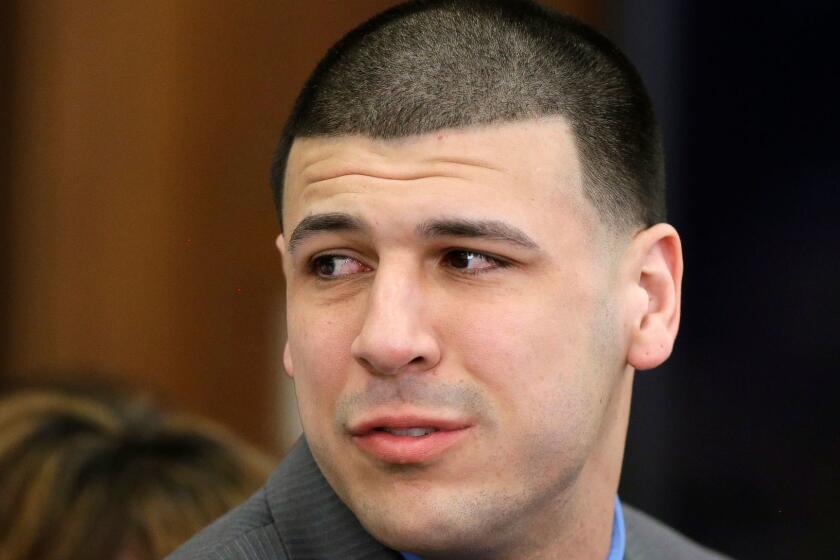‘American Sports Story: Aaron Hernandez’: How violence, drugs and football made a monster
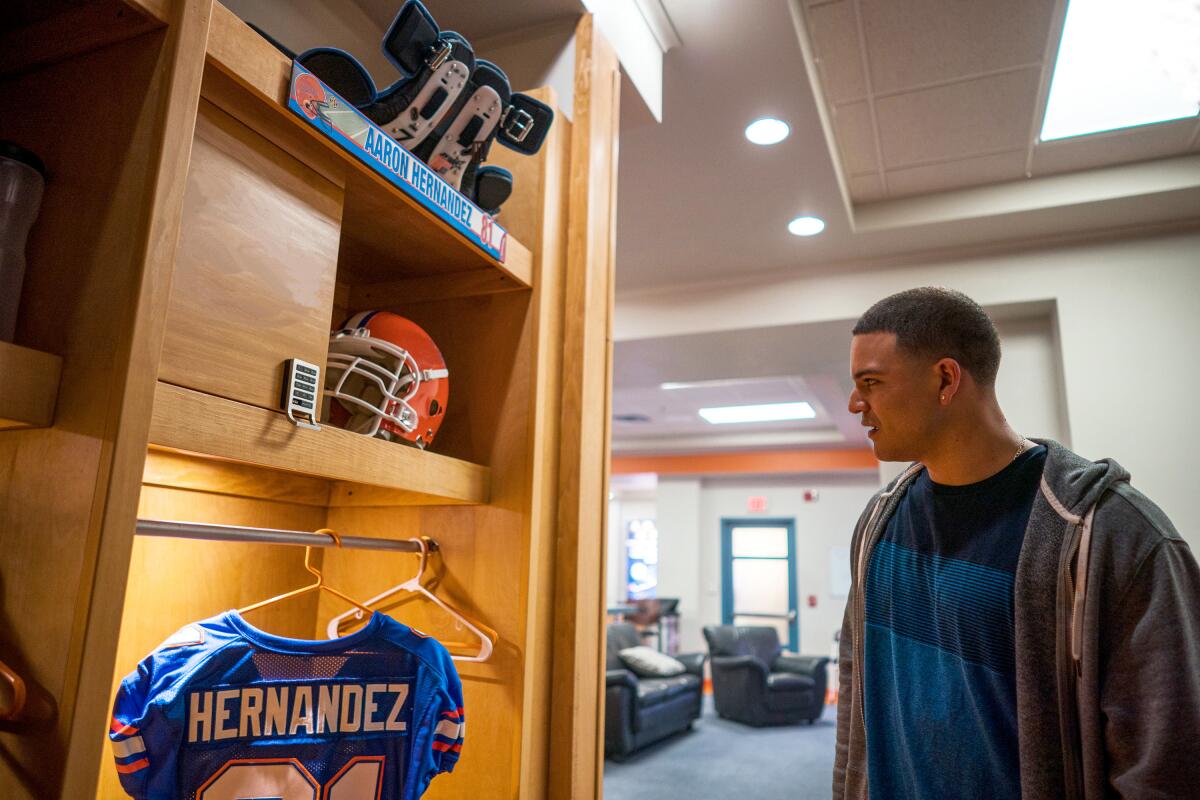
- Share via
In 2009, superstar tight end Aaron Hernandez helped the Florida Gators win a national championship. In 2012, Hernandez played in a Super Bowl for the New England Patriots and signed a $40-million contract extension.
But that same year he was investigated in connection with a double homicide. A year later he shot Alexander Bradley, one of his best friends, through the eye and murdered another man, Odin Lloyd. Two years later, Hernandez was convicted of Odin’s murder, and in 2017 Hernandez killed himself while in prison.
Those are the headlines of Hernandez’s brief and violent life and death, the details that reach beyond the die-hard football fan and create a hard-to-shake image in popular culture. While Hernandez clearly had drug problems, committed violent crimes and grew increasingly paranoid, his fuller story is a complicated one: Hernandez suffered physical abuse in a violent and dysfunctional family; was sexually abused as a boy; felt compelled by society’s strictures to hide his homosexuality; was chewed up and spit out by college football’s powers-that-be; and his brain was severely damaged, resulting in chronic traumatic encephalopathy, or CTE, that likely affected his behavior.
Those nuances and much more were uncovered and laid out by the Boston Globe’s Spotlight investigative team in 2018, in a series of newspaper articles and a podcast. That was followed by a 2020 Netflix docuseries, “Killer Inside: The Mind of Aaron Hernandez.”
1
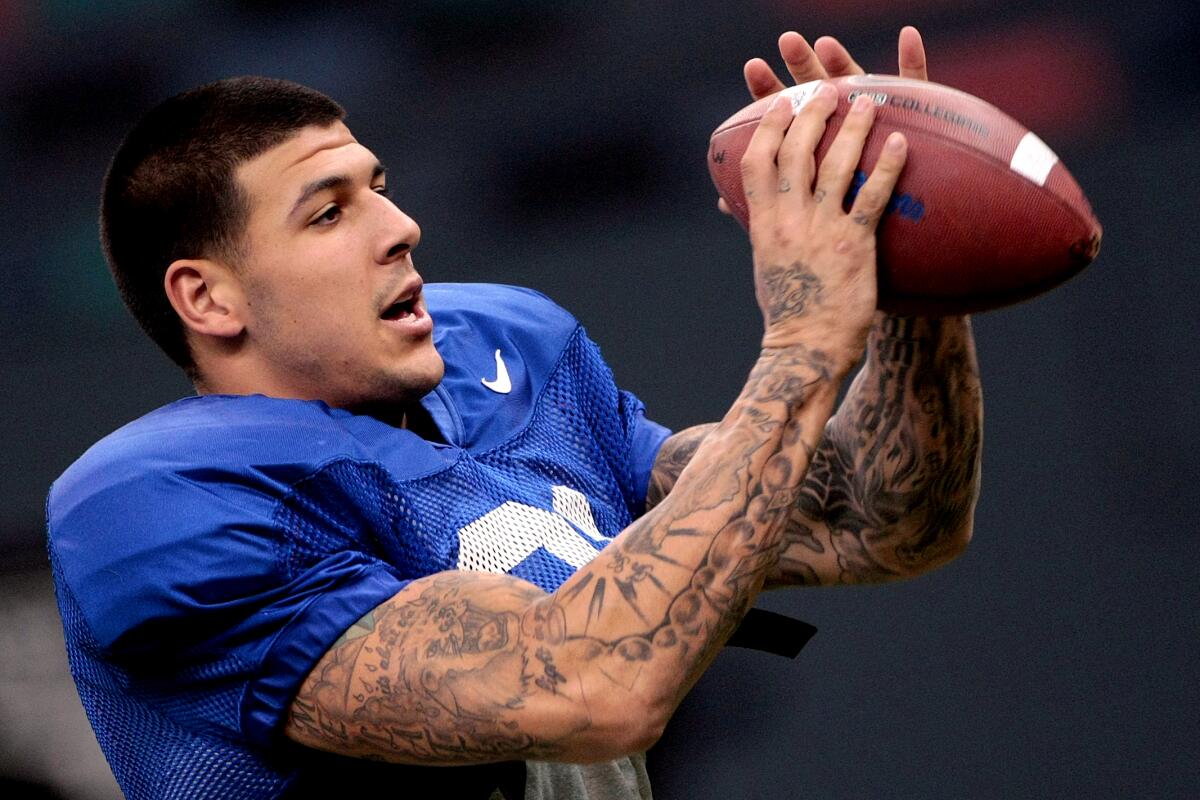
2
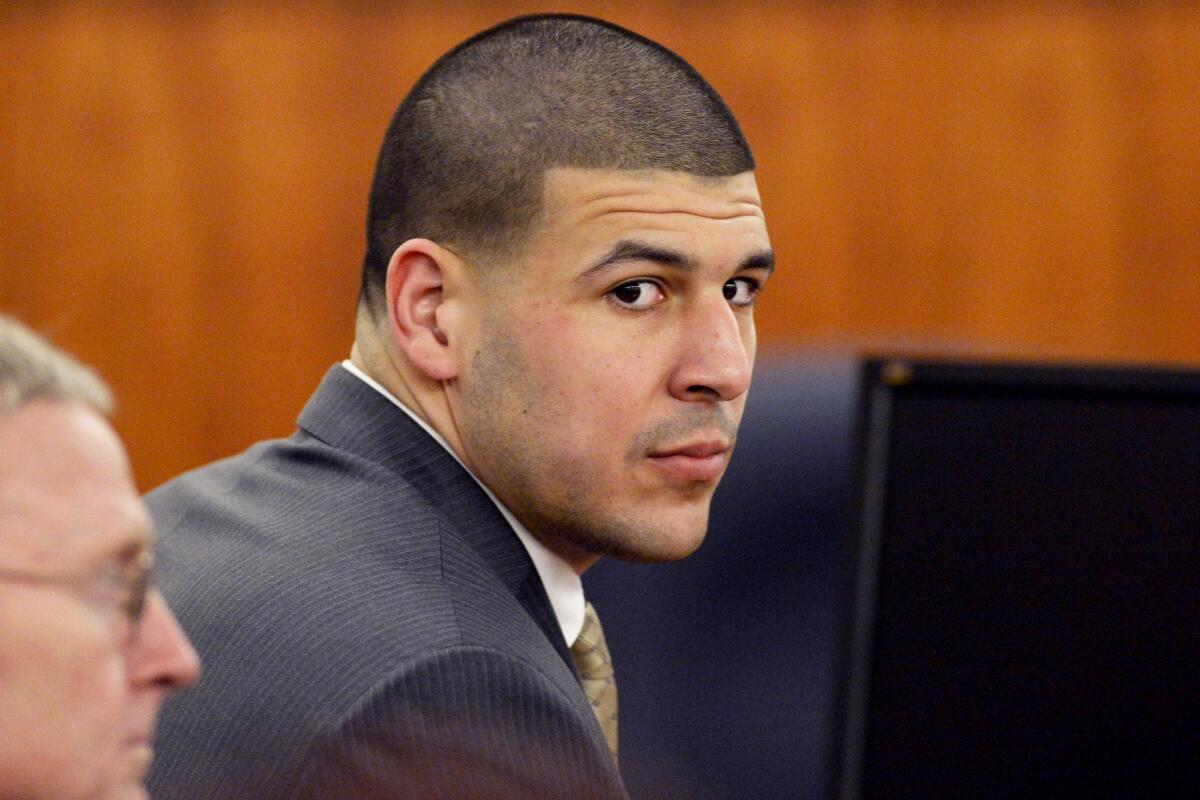
1. Aaron Hernandez in 2009 when he played for Florida. (Dave Martin / Associated Press) 2. In 2015, Hernandez during jury deliberation at his murder trial. (AP Pool)
But these days, more Americans get their facts from scripted series than from newspaper series, podcasts and documentaries, whether it’s “When They See Us,” Ava DuVernay’s Netflix limited series about the Central Park Five or the “American Crime Story” retellings of the O.J. Simpson saga and the murder of Gianni Versace. Now the “American Crime Story” producing team is branching out with “American Sports Story: Aaron Hernandez,” a 10-episode retelling of Hernandez’s life and death based on the Globe’s reporting. The limited series premieres Tuesday at 10 p.m. on FX with two episodes and streams the following day on Hulu.
Five months after Aaron Hernandez hanged himself in a prison cell with a bedsheet while serving a life sentence for first-degree murder, the former New England Patriots tight end has been diagnosed with severe chronic traumatic encephalopathy.
Brad Simpson, one of the series’ executive producers, says they were tipped off by FX’s top executives, Nick Grad and John Landgraf, that the podcasts were about to be released, so they read the Globe’s articles.
“It had this deep reporting that we love to have in our shows, and we started developing the series with an eye toward it being part of our different franchises about the culture of America,” he says.
Simpson says fellow executive producer Ryan Murphy loved that this was a story about “a person with a fractured identity, as so many of our shows are.”
The reporting revealed a story that was “far more heartbreaking and complex than I had considered,” says Nina Jacobson, another executive producer. “When you think you know a story and then you come across something deeply reported, that really changes how you see it [and] that always makes me stand up at attention.”
She adds that since football is our national religion, Hernandez’s rise and fall “was not just the story of one person but a mirror back to us as a country.”
Among the shows our TV writers are looking forward to this season are ‘The Golden Bachelorette,’ ‘Matlock,’ ‘St. Denis Medical’ and ‘Landman.’
Numerous writers were interested in tackling the tale but the producers chose Stuart Zicherman because of his résumé — Simpson cites “The Americans” — but also because he is a passionate football fan who nonetheless has the emotional distance to see the damage the game can wreak on people. Simpson says Zicherman had a compelling pitch about the intersection of celebrity, sports, sexuality and masculinity.
“It’s character first and football second, and what made this story different from a million sports stories out there is the story about Aaron as well as his family, the people on his team and the coaches,” he says. “It becomes a Shakespearean tragedy with compelling characters at the center.”
Zicherman says he went in for his initial pitch with a huge scroll that, when unfurled, laid out all of the story’s twists and turns. “I love writing about stories people think they know but they really don’t,” he says. “We tend to label people, and Hernandez was a monster, but no one’s born a monster and I wanted to tell that story without forgiving him for what he did.”
Zicherman drew on the “American Crime Story” concept of “taking a crime or event and making it about something much bigger in the fabric of America.”
The show explores toxic masculinity at home and in locker rooms, how violence on the football field can spill into daily life, and how a dysfunctional family can be both a support and a trap.
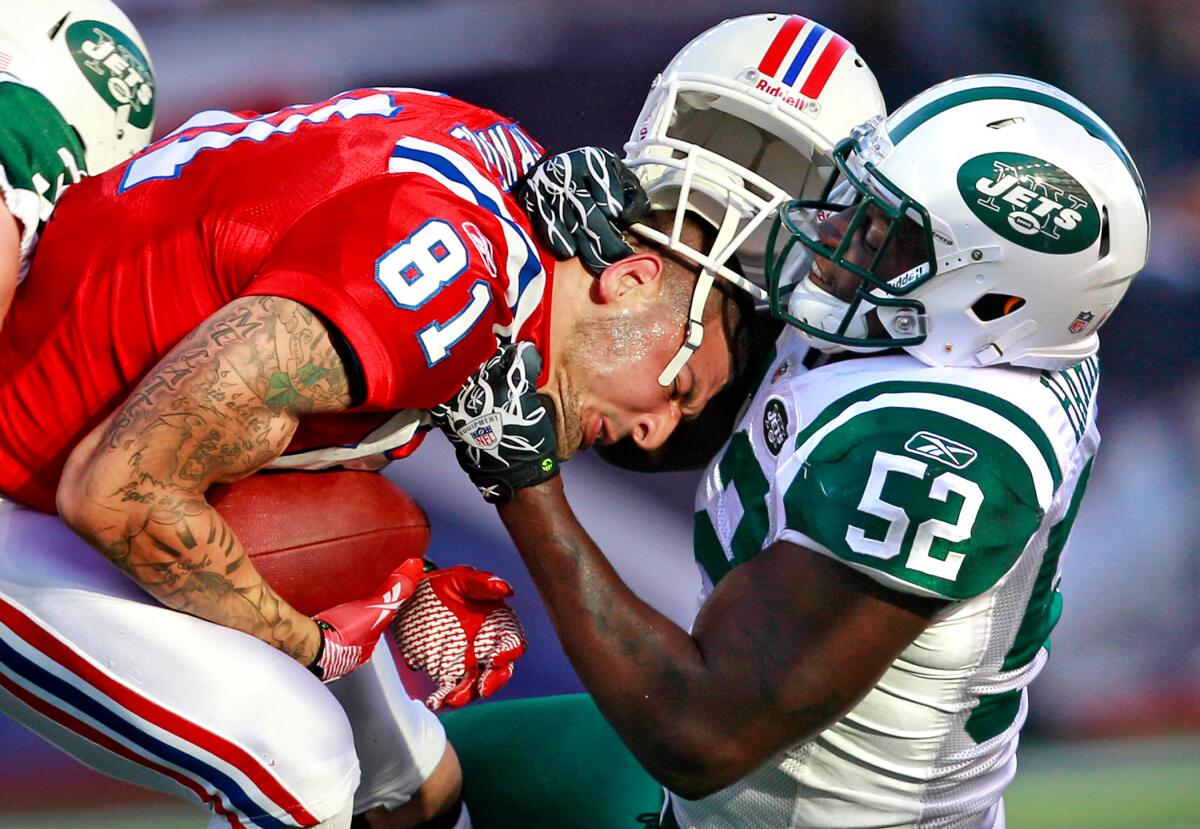
There’s also the issue of CTE, the brain injury caused by repeated blows to the head. “We obviously don’t want to say CTE is what turned Aaron into a murderer — he’d been exposed to violence and was prone to violence — but he did become very paranoid with an even shorter temper,” Zicherman says, noting that Hernandez’s drug use also would have exacerbated his brain injuries.
He lays out the story to show the people and institutions who directly harmed Hernandez or at least failed to “change the narrative” because of their own selfish motivations, like then-Florida coach Urban Meyer, who seduced Hernandez and his family with promises he didn’t keep and then shoved the young man out the door when he became a challenge.
In a group of more than 100 professional football players whose brains were examined after their death, new research has found that virtually all suffered from chronic traumatic encephalopathy, a condition likely brought on by repeated blows to the head.
“We make commodities out of our athletes and we don’t always see what’s best for them,” Zicherman says. “The Patriots were also blinded by his talent.
“But I also want the audience to see that there’s a much bigger picture here and that we’re all a bit complicit — we raise our athletes up and pay them a fortune and build them up as heroes,” he says, only to turn on them when things go awry.
Beyond the big picture, Zicherman focused on Hernandez’s story as someone “trying to find his authentic self,” giving him a throughline as Hernandez jumps from childhood to high school to Florida, the NFL and eventually the world of drugs and crime that consumed him. “By the end he’s gone mad with all the secrets he was keeping.”
Zicherman says the Globe’s Spotlight team not only provided a meticulous and thorough story, they let him come to Boston “to ask a million questions” and then they visited the writers’ room to answer even more. “They’d talked to everybody and they’d done that work, and they were a tremendous resource,” he says.
But journalists and documentary filmmakers are hemmed in by what they can demonstrably prove. Zicherman says the series resists overt fictionalization, but they felt it had to go further than the Spotlight series.
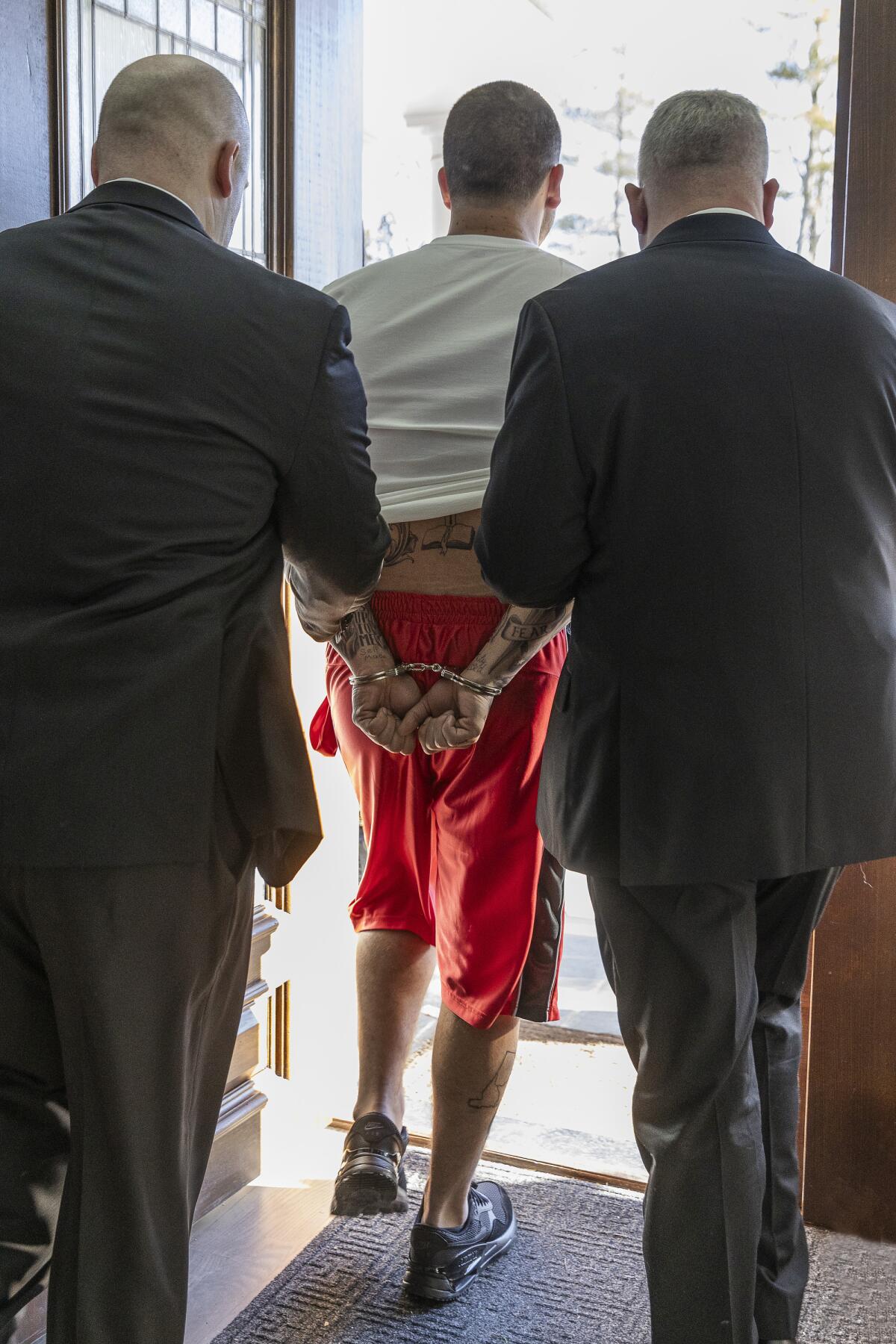
“In the writers’ room we spent a lot of time connecting the dots and trying to emotionally figure out why things happen and give the answers to things,” he says.
Most important was explaining why Hernandez murdered Lloyd. “It always bothered me that in all the research no one knew,” Zicherman says. “It was a clumsy attempt that seemed unpremeditated and it didn’t make sense.”
Theories include that Hernandez wanted to keep a lid on his sexuality or his involvement in the double homicide, but Zicherman thinks it was more about how far Hernandez had descended.
“I built to the murder from the stew of all the moments throughout the season,” Zicherman says. “Hernandez is hiding so many secrets and suffusing them with drug use, and he’s paranoid as hell because he’s taken a lot of hits to the head. It’s all of those things combined; I don’t think it was a singular thing.”
Beyond the scripts, the most important factor would be casting Hernandez. Here, the team got lucky. Jacobson was producing “The Hunger Games: The Ballad of Songbirds and Snakes” and watching Josh Rivera at work. “I got to really see what he was made of,” she says of Rivera, who had previously co-starred as Chino in Steven Spielberg’s “West Side Story.” “He’s an incredibly sophisticated, grounded, natural and charismatic actor. And he was that on every take.”
But while Jacobson was sold, she also trusted Murphy’s judgment and wanted to let the audition process play out “to see if he would float to the top for Ryan as well.”
At the end of callbacks, after mixing and matching actors contending for various jobs, Murphy turned and said, “Well, it’s obviously Josh,” so they called him back in before he could leave the audition.
Zicherman says a lot of the other actors emphasized the violence and darkness, but Rivera “played the vulnerability and other emotional components and the interior emotionality. Once we had him I started stripping dialogue away to let moments play on his face — the other characters could talk and we can watch his heartbreak.”
(Rivera, he adds, is also a “goofball who likes to sing and dance and make jokes,” and that Hernandez, before things went bad, was the class clown.)
Rivera is in nearly every scene. Simpson notes that he had to work out regularly to stay big and endured multiple hours of makeup for the tattoos. “He shouldered it incredibly well and he was always game and enthusiastic,” Simpson says. “He was often exhausted, but the fact that he didn’t slip into a dark place is a testament to who Josh is as a human being. He set the tone for the set.”
Simpson recalls only one day where Rivera was, understandably, overwhelmed by the task. “We were in a muddy field at 3 a.m. reenacting the murder of Odin Lloyd, and there was just a moment where Josh had to stop. He turned to everybody and said, ‘This is just too incredibly sad,’” Simpson says. “I think we were all haunted by that moment.”
More to Read
The complete guide to home viewing
Get Screen Gab for everything about the TV shows and streaming movies everyone’s talking about.
You may occasionally receive promotional content from the Los Angeles Times.
